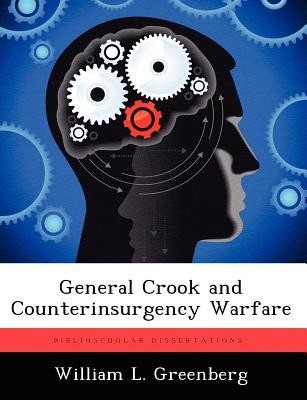
- We will send in 10–14 business days.
- Author: William L Greenberg
- Publisher: BiblioScholar
- ISBN-10: 1249410738
- ISBN-13: 9781249410737
- Format: 18.9 x 24.6 x 0.7 cm, softcover
- Language: English
- SAVE -10% with code: EXTRA
Reviews
Description
This thesis investigates the operational and tactical procedures in counterinsurgency warfare developed by General George Crook while commanding U.S. Army forces in southwest and the northern plains. This work includes a brief introduction of General Crook's career before and during the Civil War. The study examines the capabilities of the U.S. Army and its Apache and Sioux opponents during Indian campaigns, which Crook participated in. Inherent in the study is an in-depth examination of Crook's campaigns against the Apaches in the 1872-75, 1882-86, and against the Sioux and Cheyenne in 1876-77. This study concludes that General Crook, through trial and error, developed a distinct brand of operational and tactical procedures to conduct effective counterinsurgency warfare. Though lacking a coherent strategic national policy concerning the Indians, Crook was capable of successfully developing and executing a coherent counterinsurgency policy at the operational and tactical levels. This comprehensive program produced victories against his enemies in the field and an integrated acculturation policy for the Indians who resided on the reservation. Crook's use of Apache scouts and the pack mule train revolutionized the Army's ability to track down the insurgents and defeat them. His use of population controls coupled with economic development provided his Indian opponents an alternative way of life for their societies.
EXTRA 10 % discount with code: EXTRA
The promotion ends in 16d.05:55:49
The discount code is valid when purchasing from 10 €. Discounts do not stack.
- Author: William L Greenberg
- Publisher: BiblioScholar
- ISBN-10: 1249410738
- ISBN-13: 9781249410737
- Format: 18.9 x 24.6 x 0.7 cm, softcover
- Language: English English
This thesis investigates the operational and tactical procedures in counterinsurgency warfare developed by General George Crook while commanding U.S. Army forces in southwest and the northern plains. This work includes a brief introduction of General Crook's career before and during the Civil War. The study examines the capabilities of the U.S. Army and its Apache and Sioux opponents during Indian campaigns, which Crook participated in. Inherent in the study is an in-depth examination of Crook's campaigns against the Apaches in the 1872-75, 1882-86, and against the Sioux and Cheyenne in 1876-77. This study concludes that General Crook, through trial and error, developed a distinct brand of operational and tactical procedures to conduct effective counterinsurgency warfare. Though lacking a coherent strategic national policy concerning the Indians, Crook was capable of successfully developing and executing a coherent counterinsurgency policy at the operational and tactical levels. This comprehensive program produced victories against his enemies in the field and an integrated acculturation policy for the Indians who resided on the reservation. Crook's use of Apache scouts and the pack mule train revolutionized the Army's ability to track down the insurgents and defeat them. His use of population controls coupled with economic development provided his Indian opponents an alternative way of life for their societies.


Reviews